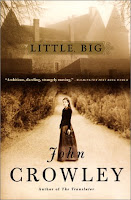A multi-generational tale of a family that is somehow connected to the world of Fairy. There's a family tree chart at the beginning, and I found myself referring to it frequently because I couldn't keep track of all the people. The book starts in the middle of the family's story (Daily Alice meeting and marrying Smoky and rescuing him from his anonymity), but then jumps backwards a few generations (Violet Bramble leaves England and her fairies behind, only to meet John Drinkwater and learn that the world of Fairy is somehow also close to the crazy multi-style, multi-fronted house he built), and then moves forward and follows some of their children. It's a strange book and I couldn't tell if I liked it even near the end-- the family all know (to varying degrees) that they are somehow "part of a Tale," and I found myself waiting for something to make sense of everything. The ending is pretty brilliant, and really works-- it's the kind of revelation that transforms the characters and the story, makes sense of some of the strangeness and raises a whole batch of new questions. The title comes from (I think) the notion of some of the family that the world of Fairy grows larger the further you go into it-- only the smaller parts of it overlap with our world, so we tend to only see little fairy beings.
Part of the reason I wasn't sure I liked the book, and didn't really enjoy it so much while I was reading it, was that the characters are all so unhappy and, to some extent, difficult to like or identify with. One young man in the family meets an odd bird-person and is granted the gift of being irresistible to women; what he doesn't learn until later that this is really a curse that makes it impossible to resist any woman-- he is consumed with love by each of the many women he is spending all his time and vital energies chasing around the country to be with. Another young couple in the city have a very strange relationship that seems unhealthy-- but when you know the end of their story it makes a great deal of sense, somehow. Another disconcerting thing I found, at least early on my reading, was that although the book is written in a style that reminded me of George MacDonald, there is quite a bit more nudity and sex than I would ever expect to find in a MacDonald story (not much by modern standards, I think it was that the style caught me off-guard).
Other strange and interesting characters-- a dead and ancient king brought back from the dead to become President and tyrant; a woman who is effectively a wizard, but her power stems from her mastery of the Art of Memory, her ability to make sense of things and let the things she knows infuse each other with meaning so her understanding grows and changes. A changeling child, stolen from her mother and brought up by the fairies apparently only with one rather small task.
There were hints of the ending of the story, and the ones I caught (or know now I failed to catch) were in the names. Auberon seemed like a family name, and I didn't really think about it (why it sounded vaguely familiar, how it could be pronounced). I was intrigued by the mention of a family nickname for the younger Auberon's lover, his "dark girl" Sylvie-- she mentions in passing that her family sometimes called her Tita, or Titania. But even with those clues, I'm not sure I could have guessed (still not sure I understand) the way the story ends. Some of the other parts of the story make me think I'm not quite as familiar with the characters and stories of Fairy as I ought to be, and maybe if I were these things would make more sense.
In a way, this book reminded me of The House of the Spirits and 100 Years of Solitude-- a multi-generational family with hints (and more than hints) of the supernatural, magical experiences woven into the every-day. It was the little moments like this that I loved, where you don't know quite whether or not to believe-- one of the cousins who can't sleep sees the Sandman in the room of the children, but is told he won't get any sleep. Or, the Christmas where they write letters to Santa and burn them in the fireplace (as per their tradition), and Santa shakes his head over what some of them ask for because he knows what it will cost in unhappiness, but the requests are, in a sense, fulfilled.
I hadn't heard of this book or John Crowley until I saw the title listed on Alan Jacob's syllabus for a "Modern Mythology" course somewhere online (that was over a year ago, and now I can't find it). It does seem like a book that would be interesting to discuss, and one I wouldn't mind having other people help me make sense of.
| Title: | Little, Big, or, The Fairies' Parliament |
|---|---|
| Author: | John Crowley |
| Date published: | 1981 |
| Genre: | Contemporary Fantasy / Fairy Tale |
| Number of pages: | 538 |
| Notes: | recommended by Alan Jacobs (sort of) |



0 comments:
Post a Comment